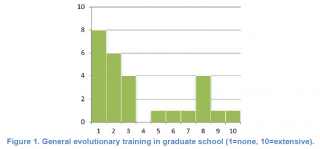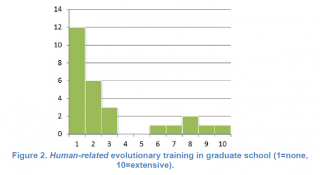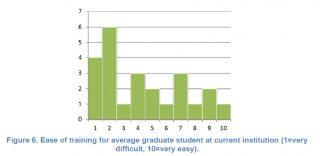Education
It Is Incredibly Difficult to Obtain an Evolution Education
How Modern Academia Stands in the Way of Advancing Evolutionary Psychology
Posted September 20, 2015
Darwin’s ideas were significant. The field of biology didn’t even exist in university curricula before Darwin published his landmark works on evolution (see Allmon, 2009). Darwin’s (1859) expose on the nature of life itself caused people to fully reexamine questions such as where life comes from, how features of organisms relate to ancestral environments, and what it means to be human. As a result of Darwin’s influence, we now better understand such issues as human health (see Platek et al., 2011), crime (see Daly & Wilson, 2005), religion (see Wilson, 2002), and more. Much more. In effect, Darwin turned on the light for all scholars who study any facet of the nature of life – including what it means to be human.
Darwinizing Psychology
If you follow my work (see my brief evolutionary psychology textbook, Evolutionary Psychology 101), you know that I’m a staunch advocate for Darwinizing the field of psychology – based on the premise that the evolutionary approach to psychology provides us with the capacity to ask and answer new questions about human behavior that simply could not be asked otherwise. Without the evolutionary approach to psychology, we would have a much weaker understanding of such things as (a) how being a step-parent relates to familial crime (see Daly & Wilson, 1985), (b) how being a young male corresponds to a high risk of morbidity (or early death; see Kruger & Nesse, 2006), (c) how male/female differences exist in major areas of human mating (see Schmitt et al., 2005), and more. Way more. As I see it, if you want to understand what human behavior is all about, you’d better understand the basics of evolution or else you are doing your scholarship with the lights turned off.
Evolutionary Training is Sorely Lacking in Modern Universities
So you’d think that more than 150 years after the publication of The Origins of the Species, universities would have strong infrastructures to educate students about evolution. However, in fact, getting an evolution education is extremely difficult in modern universities – and this fact is especially true when it comes to human-related fields such as psychology.
A few years ago, I worked with Daniel Glass and David Sloan Wilson on research into this issue. We conducted a straightforward study (with David overseeing and implementing data collection). We first examined the proportion of articles in the upper-tier psychology journal, Behavioral and Brain Sciences, to see how many articles published between 2000 and 2004 connected with evolution. Using a key-word search (seeing, for instance, if the word “evolution” or “adaptation” was in the article’s title), we found that 31.5% of the articles clearly connected with evolution. I’d call this good news – to some extent, these data suggest that evolution has strongly arrived in the field of psychology. For anyone who thinks that evolutionary psychology is somehow “fringe science,” I point them toward this finding. Anyone who thinks that evolutionary psychology is fringe science is simply wrong.
The next step was to survey the first authors of these evolution-infused articles to find out where they learned evolutionary concepts – and to get their take on the question of how easy it is to obtain an evolution education. The results are striking. The very short version is this: By and large, these scholars who are publishing evolutionary psychological research in the world-class journal Behavioral and Brain Sciences have been forced to teach themselves about evolution – and they found their formal education in psychology extremely lacking in this regard.

For instance, in this survey, participants were asked “How much general evolution training did you receive in graduate school.” On a 1-10 scale (with 10 being “extensive”), the mean (or average) of the ratings was 3.74. On average, the authors felt that they had received very little training in evolution in graduate school.

The next question in the survey asked participants “How much evolution training related to human affairs did you receive in graduate school” – using the same 10-point scale. Here, the mean score was 3. When it comes to evolution training related to human affairs, the situation is even bleaker.

The participants, who were now beyond their own graduate training and onto academic positions at universities – mostly in the USA - were then asked how easy it would be for students at their current universities to obtain an evolution education. On a 10-point scale (with 10 being “very easy”), the mean score was 4.33 (corresponding to “pretty difficult”).
Solving Academia’s Evolution Problem
We need to face facts. The USA has a major evolution problem. And this problem is not only in K-12 education. Based on the data we obtained in our research, our universities, which should be bastions of progressive education, are sorely lacking when it comes to educating people about evolution. The problem is not small by any stretch of the imagination.
SUNY New Paltz (where I am fortunate to work) has an interdisciplinary program in evolutionary studies (EvoS) at the undergraduate level. This program, modeled after the world's first such program which started under David Sloan Wilson’s leadership at Binghamton University, is designed to address America’s evolution problem. We’ve been churning out graduates with official minors in evolutionary studies for nearly a decade now – and I have to say, being the founding director of this program has been, without question, one of the most rewarding aspects of my work. And with the help of a grant from the National Science Foundation a few years back titled “Expanding Evolutionary Studies in Higher Education” (co-awarded to New Paltz and Binghamton), we have helped expand this curricular model to several other schools, including Albright College, the University of Alabama, University of Missouri, and more.
As evolutionarily oriented scholars, we see the value of exposing students across all academic majors to Darwin’s big ideas. Is EvoS the answer to America’s evolution problem? I figure it’s at least a start.
Bottom Line
For various reasons, many of which are political, there is an all-out war going on against evolution education – at every single level. When people think about problems with evolution education in the USA, they rarely consider that this problem exists within our universities. Guess what? The problem may well be worse at the university level than at any other. To me, this is downright depressing given how powerful evolution is in illuminating questions that relate to all aspects of what it means to be human.
What will the future hold when it comes to evolution education? Will evolution education remain confined to subsets of the biological sciences within our universities? Or will Darwin’s vision be realized – with evolutionary principles being used to shed light on all aspects of the living world – including human life? I don’t have a crystal ball so I don’t know the answer. But, as you can see, I think that understanding evolutionary principles is essential in the study of human behavior. From where I sit, here’s to hoping that Darwin’s full vision, of evolutionary principles applied to all aspects of life, becomes realized. In our lifetime.
If you want to read our full article on how difficult it is to get an evolution education in modern universities, it's linked here (Glass, Wilson, & Geher, 2012).
References
What Did Darwin Do? Feb. 16, 2009, SUNY New Paltz Evolutionary Studies Seminar Series. Warren Allmon, geologist, Cornell University and Director of The Museum of the Earth
Daly, M.; Wilson, M. (2005). "The 'Cinderella effect' is no fairy tale". Trends in Cognitive Sciences 9 (11): 507–508.
Darwin, C. (1859). On the Origin of Species by Means of Natural Selection, or the Preservation of Favoured Races in the Struggle for Life (link is external) (1st ed.). London: John Murray.
Geher, G. (2014). Evolutionary Psychology 101. New York: Springer.
Kruger DJ, Nesse RM: An evolutionary life history understanding of sex differences in human mortality rates. Human Nature,74 (1): 74-97, 2006.
Platek, S., Geher, G., Heywood, L., Stapell, H., Porter, R., & Waters, T. (2011). Walking the walk to teach the talk: Implementing ancestral lifestyle changes as the newest tool in evolutionary studies. Evolution: Education & Outreach, 4, 41-51. Special issue on EvoS Consortium (R. Chang, G. Geher, J. Waldo, & D. S. Wilson, Eds).
Schmitt, D.P., Alcalay, L., Allik, J., Ault, L., Austers, I., Bennett, K.L., Bianchi, G., Boholst, F., Borg Cunen, M.A., Braeckman, J., Brainerd Jr., E.G., Caral, L.G.A., Caron, G., Casullo, M.M., Cunningham, M., Daibo, I., De Backer, C., De Souza, E., Diaz-Loving, R., Diniz, G., Durkin, K., Echegaray, M., Eremsoy, E., Euler, H.A., Falzon, R., Fisher, M.L., Foley, D., Fry, D.P., Fry, S., Ghayur, M.A., Golden, D.L., Grammer, K., Grimaldi, L., Halberstadt, J., Herrera, D., Hertel, J., Hoffman, H., Hradilekova, Z., Hudek-Kene-evi, J., Jaafar, J., Jankauskaite, M., Kabangu-Stahel, H., Kardum, I., Khoury, B., Kwon, H., Laidra, K., Laireiter, A., Lakerveld, D., Lampart, A., Lauri, M., Lavallée, M., Lee, S., Leung, L.C., Locke, K.D., Locke, V., Luksik, I., Magaisa, I., Marcinkeviciene, J., Mata, A., Mata, R., McCarthy, B., Mills, M.E., Moreira, J., Moreira, S., Moya, M., Munyea, M., Noller, P., Opre, A., Panayiotou, A., Petrovic, N., Poels, K., Popper, M., Poulimenou, M., P’yatokha, V., Raymond, M., Reips, U., Reneau, S.E., Rivera-Aragon, S., Rowatt, W.C., Ruch, W., Rus, V.S., Safir, M.P., Salas, S., Sambataro, F., Sandnabba, K.N., Schulmeyer, M.K., Schütz, A., Scrimali, T., Shackelford, T.K., Shaver, P.R., Sichona, F., Simonetti, F., Sineshaw, T., Sookdew, R., Speelman, T., Spyrou, S., Sümer, H.C., Sümer, N., Supekova, M., Szlendak, T., Taylor, R., Timmermans, B., Tooke, W., Tsaousis, I., Tungaraza, F.S.K., Vandermassen, G., Vanhoomissen, T., Van Overwalle, F., Vanwesenbeek, I., Vasey, P.L., Verissimo, J. Voracek, M., Wan, W.W.N., Wang, T., Weiss, P., Wijaya, A., Woertment, L., Youn, G., & Zupanèiè, A. (2003). Universal sex differences in the desire for sexual variety: Tests from 52 nations, 6 continents, and 13 islands. Journal of Personality and Social Psychology, 85, 85-104.
Wilson, D. S. (2002). Darwin’s Cathedral: Evolution, Religion and the Nature of Society. Chicago: University of Chicago Press.




